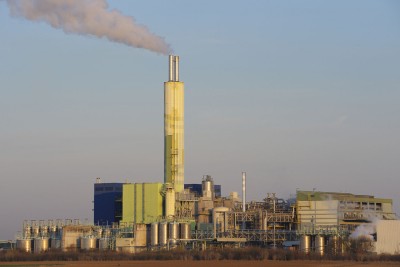EarthTalk® — Environmental Commentary by Roddy Scheer and Doug Moss of E – The Environmental Magazine

Recycling and re-use have many environmental benefits, including reducing the amount of waste we bury in already overcrowded landfills and burn in polluting incinerators, like the one pictured here. (Credit: iStock/Thinkstock)
Dear EarthTalk: Recycling can be a somewhat time-consuming task; so can you please provide some benefits of taking the time to separate my trash? — Joseph Jiminez, Houston, TX
Recycling, which turns materials that would otherwise be incinerated or become landfill-clogging waste into valuable resources, has become second nature for many Americans. As many as four out of five U.S. households already take the time to separate recyclables from trash. Those hold-outs not yet willing to bother should consider the benefits to their household and society at large.
First and foremost for consumers is saving money. Many municipalities across the U.S. today don’t charge customers for curb-side pickup of recyclables but continue to charge for garbage pick-up, so recycling is a way to reduce a household’s overall waste expense. Otherwise, consumers who collect large amounts of recyclables may be able to find a local company willing to buy them in bulk. Some municipalities operate drop-off centers where consumers can trade in aluminum cans and other scrap metal (copper, steel, etc.) for cash. Yet another way to recycle and make some cash is to sell your old stuff in a yard sale. Likewise, shopping at yard sales and second-hand stores will also prevent the manufacture of new items altogether.
And there are many benefits to recycling beyond each household’s own bottom line. Recycling saves resources. By recycling paper we save oxygen-providing, carbon-sequestering trees from the axe. By recycling plastic, we save petroleum, contributing (however slightly) to national security. By recycling metals, we take a bite out of energy-intensive mining. And recycling anything saves large amounts of energy and water that would otherwise be expended in making new goods from virgin materials. The U.S. Environmental Protection Agency (EPA) adds that recycling “protects and expands U.S. manufacturing jobs and increases U.S. competitiveness.”
Yet another benefit of recycling is reducing the amount of waste we send to overcrowded landfills and polluting incinerators. At the other end of the consumer loop, buying products made out of recycled rather than virgin materials is another way to save money, as they are often less costly and just as good quality.
Beyond recycling, reducing our consumption of goods that are heavily packaged (often with materials not recyclable themselves) is another important part of any effort to spare bulging landfills and reduce greenhouse gas emissions. And the re-use of materials that would otherwise end up in landfills is yet another way to conserve resources. It’s not difficult to think of many ways that used boxes, packaging, paper and plastic bags can be re-purposed to extend their usefulness and spare the garbage (or recycling) man. Also, composting food scraps-either at home or as part of a community effort-helps reduce the amount of waste sent to landfills and incinerators.
With world population still growing and developing countries now fully embracing an American-style consumer culture, recycling and other waste reduction techniques take on an increasingly important role in efforts to protect the environment. Indeed, there’s no time like the present to step up reducing, re-using, recycling and composting.

Recent Comments